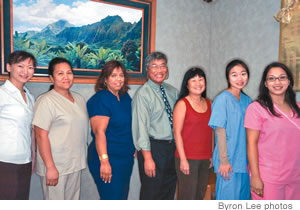Eastern And Western Medicine
Interviewed by Melissa Moniz
Wednesday - January 06, 2010
E-mail this story | Print this page | Comments (0) | Archive
 Del.icio.us Share
Del.icio.us Share

Dr. Eugene Lee
Internal medicine, Pediatrics and Acupuncture
Why did you decide to study both Eastern and Western medicine?
My preliminary training was in Chinese medicine, but I saw how I could offer patients more options by integrating Chinese medicine with Western medicine. I feel that Western and Eastern medicine each has a place in healing and wellness. Western medicine is very effective for acute problems and emergencies, and problems that need to be attended to right away.
The Western approach focuses on treating the disease. With Chinese medicine, the philosophy is more about long-term wellness, a holistic view of the patient, and understanding that “dis-ease” is due to the “dis-function” between the body and the environment or the person’s spirit. I think they both work together, especially now that there are many conditions which persist as long-term illnesses, such as diabetes, high blood pressure and asthma.
While finishing my medical degree at the University of Washington’s School of Medicine, I worked with the Northwest School of Acupuncture and Oriental Medicine and Bastyr University of Natural Medicine in Seattle. I found that having Eastern and Western practices available as resources allows me to employ the best methods on a patient.

|
What’s your philosophy on healing and medicine?
A person’s body has healing capabilities which may be derailed by negative influences of the mind or environment, or pre-existing physical conditions of the body that complicate or even prevent healing to occur naturally. In these cases, which are numerous, medicine (Eastern or Western) may be able to allow the healing process to occur more quickly or even at all.
What other injuries or conditions really benefit from acupuncture?
The World Health Organization has a list of almost 300 conditions that acupuncture can treat. The most common here in the United States are muscular skeletal conditions, stroke, brain injuries, back injuries and infertility, but acupuncture also treats many internal conditions, for example, acupuncture could be used to manage high blood pressure, and treatments would help to reduce the amount of medication a patient may need.
You will be starting a new East-West Integrative Center at REHAB. Can you talk about your involvement with that?
The REHAB Outpatient Service and Foundation has found support to start an East-West Integrative Center. At REHAB, we are starting the center to provide treatment plans that will be utilizing conventional therapies with other approaches, such as Chinese medical therapies and others. We will also develop programs to improve health, well-being and disease prevention. This type of program exists in many centers on the Mainland. Our initial offering will be to integrate acupuncture with Western therapies. Later on we will hopefully integrate herbs, diet and exercises such as tai chi and chi gong along with the more conventional therapies. Ultimately East and West will be working together to provide a complete and individualized treatment plan for any patient. The East-West Integrative Center will be on the REHAB campus. My involvement will be in advising the clinic on how to integrate and offer more treatment options as well as assist in designing treatment plans for different types of patients.
Will it be primarily yourself, or will you have a team at the East-West center at REHAB?
We have a team of acupuncturists who will work with the existing REHAB therapy team. For example, a stroke patient would undergo some acupuncture to relax them before receiving treatment, which would begin to stimulate their energy flow before undergoing conventional therapy. Some studies from China and Boston have shown that an integrated approach has shortened the recovery time of treatment for patients with stroke or back injuries.
Are you a strong believer that a merger of East and West is the future of medicine?
Definitely. We’re already headed there. It’s about how they can complement each other and finding how that fits each person best. It would involve a combination of medication, herbs, diet, different therapies such as acupuncture, massage, tai chi, yoga, exercises or Pilates.
The future of medicine will be finding a balance as well as advances by combining therapeutic approaches to treat disease, recover from injury and maintain health.
E-mail this story | Print this page | Comments (0) | Archive
Most Recent Comment(s):













